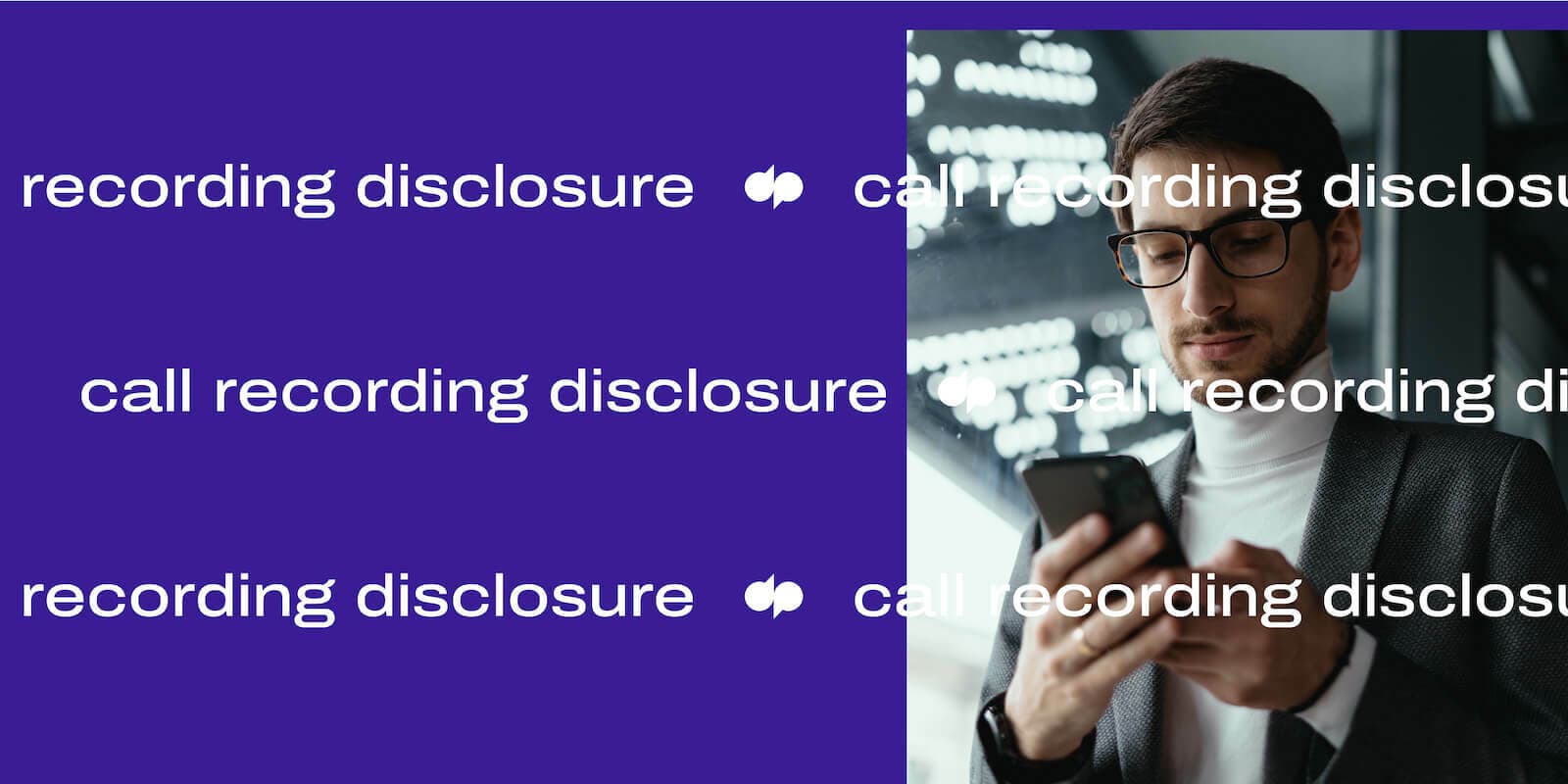“This call is being recorded” - When and how to notify your customers

Senior Privacy and Compliance Counsel

Tags
Share
The illustrious mathematician (and accidental business sage) Lord Kelvin once remarked: “If you can not measure it, you can not improve it." Telephone calls with your customers are no exception: each call not only serves a single customer but helps you build a picture of what your customers want.
Dialpad’s call recording and artificial intelligence features can help you spot valuable insights like customer sentiment, trending keywords, competitor mentions, all transcribed, stored, and analyzed automatically—plus the ability to take a deeper dive into patterns you spot.
But here’s where it can get a bit tricky: How do you capture those customer insights while keeping compliant with laws and your customers’ expectations? In this post, we take a closer look at some key elements of compliance regarding recording phone calls, including the states where two-party consent is required.
Customer calls in the age of Big Data
Call recordings might be great for training or keeping a permanent record of a call, but all the valuable data of the call? It’s still locked up as sounds on tape (well, on a hard drive).
To spot trends, measure them, and learn from them means taking advantage of modern business phone systems like Dialpad, which enables not only recording, but call center transcription and real-time analytics to know how your call is going—and how to improve it—right as it’s happening:

From recording to transcription to real-time assistance
Call recording laws were written in the 20th century, long before smartphones and fancy recording devices, let alone Dialpad’s industry-leading real-time transcription and analytics. There’s federal law, yes, but there are also state laws that differ from state to state, and most of them don’t distinguish between recording and transcription. Some jurisdictions, like California and New York, use terms like “interception” or “overhearing”. The potential for distinctions among these various terms might be fodder for interesting legal cases, but for businesses, they all point the same way: Don’t be clever, just be compliant.
That’s why we recommend the simple rule of thumb of giving the same notification whether you’re recording or transcribing. No change to your existing agent training, and you get more benefit from it.
One-party consent law vs. All-party consent
Usually it’s enough that one person on the phone call knows it’s being recorded or transcribed. In these “one-party consent” jurisdictions, no additional notification is required when your employees are recording or transcribing a phone call. In a minority of US states, however, and in some countries, consent of all parties in the call is required—and that means notification. Some folks say “two-party consent” but we prefer to say “all party” because in modern phone systems like Dialpad it’s easy to conference in a third person, or add a supervisor to a contact center call.
So whether your disclaimer is in the form of a pre-recorded voice, an automated beep, or done live by your employee, the message is the same: This call may be recorded.
Inbound calling
When your customers call you, they increasingly know what to expect: “This call may be recorded for quality and training purposes.” This disclosure is now a fixture of the landscape, like touch tone phone trees and mediocre hold music, and for good reason: Clear notification of potential call recording keeps you in the clear.

Outbound calling
We would all love to live in a world where all our customers came to us. But usually, you have to call them. And if you’re capturing that call data with call recording or transcription, that means making sure they know they’re on the record. That’s why Dialpad includes detailed settings so you can customize call recording in a way that works for your business, including automating the notification.
Prefer not to mess with the call recording or transcription notification? We can automate that, too: Dialpad’s exception list feature lets you identify area codes to automatically skip recording and transcription in your phone conversations. No recording, no notification, no sweat.

And yes, you can enable your agents to go off the record if needed, for instance if they are receiving a payment card number or other sensitive information:

Notification requirements by jurisdiction
Sure, wiretapping laws and legal advice can and do change, but everyone needs somewhere to start. To save you from reading Supreme Court rulings and state criminal codes, we’ve put together the following list to smooth out the ambiguities and give you a practical perspective on which U.S. states require which notification. Your use case may be different and we’re your phone company, not your legal counsel, so use this as a starting point and talk to your friendly local telecommunications lawyer if you need more details.

One-party consent states
Alabama
Alaska
Arizona
Arkansas
District of Columbia
Georgia
Hawaii
Idaho
Illinois
Indiana
Iowa
Kansas
Kentucky
Louisiana
Maine
Maryland
Michigan
Minnesota
Mississippi
Missouri
Nebraska
New Jersey
New Mexico
North Carolina
North Dakota
Ohio
Oklahoma
Oregon
Pennsylvania
Rhode Island
South Carolina
South Dakota
Tennessee
Texas
Utah
Vermont
Virginia
West Virginia
Wisconsin
Wyoming
Federal law (18 U.S.C. § 2511)
Two-party consent states
California
Colorado
Connecticut
Delaware
Florida
Maryland
Massachusetts:
Montana
Nevada
New Hampshire
Oregon
Washington
Considering recording telephone calls? Get the most out of your business conversations with Dialpad analytics.
Now that you know how to compliantly record conversations or transcribe phone calls, make sure you’re using the industry-leading analytics of Dialpad Ai to turn those calls into valuable customer insights and effective agent training.
A good place to start is Dialpad’s legal whitepaper on recording, transcription, and using artificial intelligence to understand exactly what your customers are thinking, all while meeting customer’s expectations and local laws.
Or, if you have operations or customers in the EU, learn more about GDPR compliance here.
Stay compliant with Dialpad's customizable call recording settings
Let us walk you through it, or take a self-guided interactive tour of the app on your own first!








